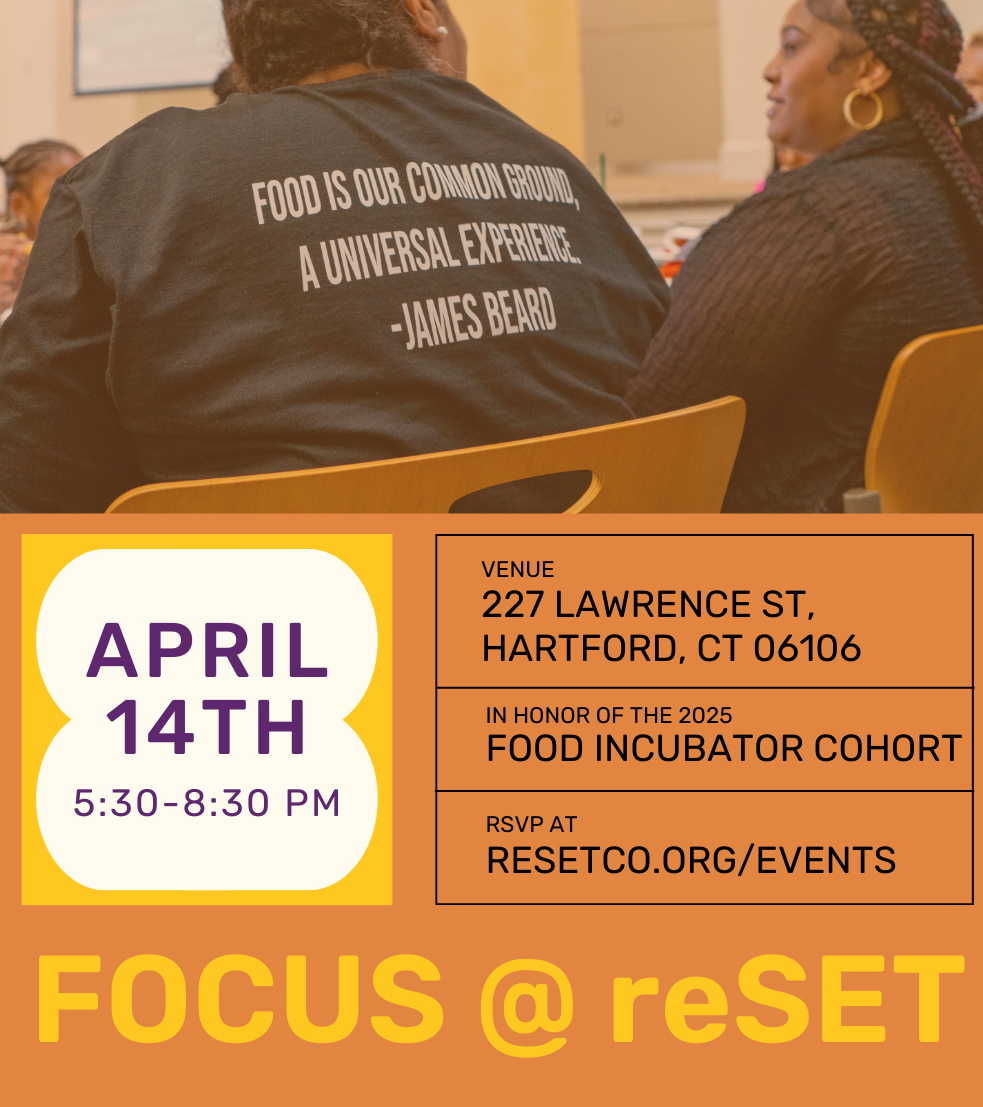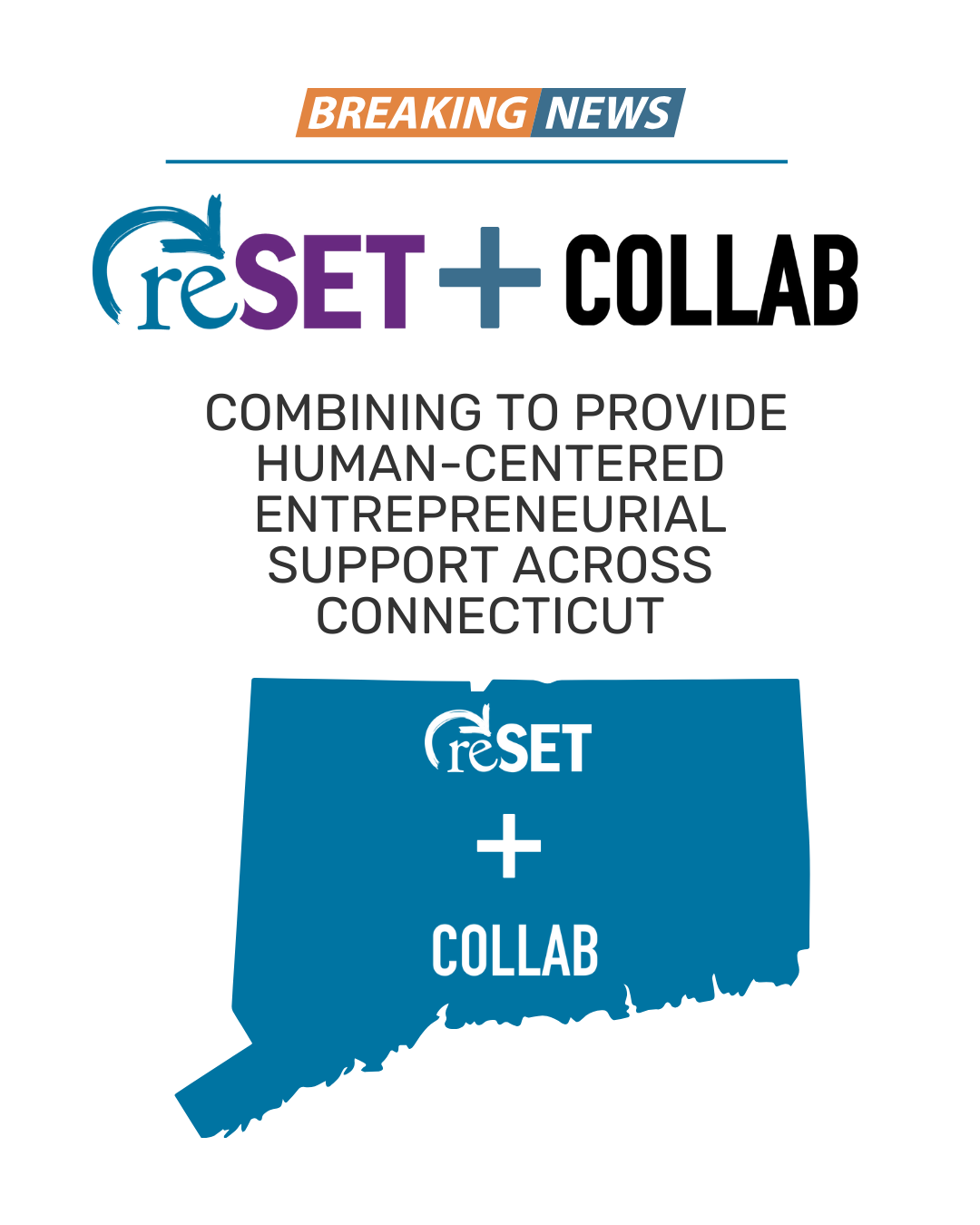For full Crain’s Connecticut article details and related content, please click here.
Spencer Curry, CEO of Trifecta Ecosystems; Ojala Naeem, Managing Director at reSET; Aiswarya Arul (Isshi), summer intern at reSET; and Lanna Nawa, Co-Founder of ImpactMart at reSET. | Photo courtesy of reSET
Close on the heels of an exodus by juggernauts General Electric Corp. and Aetna Inc. to the heart of urban hipness—Boston and Manhattan—suburbia-centric Connecticut is pulling all stops to grow promising young companies in downtown spaces.
At Stamford, plans are underway to design a pedestrian- and bike-friendly downtown, redevelop a memorial park, make Wi-Fi a staple, extend the trolley hours, create a co-learning area for adult students, build business accelerators and develop a co-working space at a public library.
“We are seeking to accelerate the growth of an innovation community,” said Chris Bruhl, president and CEO of the Business Council of Fairfield County. The group was part of a consortium that put together a winning proposal in June for $2 million in funding from CTNext, a state-funded subsidiary of the quasi-public venture capital firm Connecticut Innovations. Bruhl said an additional $5 million is expected to be raised from the private sector and the City of Stamford, and currently three co-working spaces are privately capitalized.
“We are helping to grow companies that are two to five years old by developing talent and making connections through our innovation district,” Bruhl said. “Nestle Waters, Purdue Pharma, Pitney Bowes are all buying from small, diverse, stage 2 companies.”
Connecticut ranks fourth nationally for bioscience patents per capita, according to the 2017 edition of the Connecticut Economic Review by the Connecticut Economic Resource Center, Inc. and Eversource. Yet, per the 2017 Kauffman Index Startup Activity State Report, Connecticut was ranked only 18th, among the smallest 25 states, with Nevada leading the pack in start-up activity, followed by Oklahoma, Wyoming, Montana and Idaho. Among the larger states, California was ranked first, followed by Texas, Florida, Arizona, Colorado and New York.
“What is it that’s happening at other places with a stronger culture for startups?” asked Bruce Carlson, president and CEO of the Connecticut Technology Council. “It’s networks. Connecticut did not have that, so the governor [Dannel Malloy] created funding for the Connecticut Innovation Ecosystem, which matured into CTNext. Now we have a significant amount of incubation and acceleration spaces in Connecticut.”
Malloy in 2012 launched the public-private partnership to accelerate startup activity and innovation. The initiative was funded by the bipartisan 2011 Jobs Bill with four locations chosen as hubs to provide financial, technological, mentorship, and collaborative work spaces in Hartford, New Haven, Stamford and Storrs.
The roots of that program grew into CTNext, which is spurring startup and innovation districts across Connecticut through its Innovation Places program. Public Act 16-3, which was passed in June 2016, allocated $67.5 million to CTNext with $30 million earmarked for the Innovation Places program, under which cities, towns and communities across the state developed proposals this summer, competing for funding to transform their regions into innovation hubs. CTNext selected seven finalists, and following a series of public pitches and walking tours in each location, four were designated as “Innovation Places.” The winners—Stamford, New Haven, Hartford and East Hartford, and the New London/Groton area—were awarded a total of $6.9 million. Over a five-year period, CTNext expects to distribute a total of $30 million.
“We’re only at the beginning of the implementation process, but we are very excited to see these innovation districts come to life,” said Lauren Carmody, director of marketing and communications at Connecticut Innovations. “Each community’s plan is designed in large part to support companies operating in high-growth industries such as health and bioscience, insurance and financial services, advanced manufacturing, digital media and green technology—industries that have the greatest potential to generate good paying jobs for Connecticut residents and, ultimately, much needed tax revenue for the state.”
At the other end in Hartford, close to a hundred social entrepreneurs brainstorm ideas with mentors, pitch to potential investors, and receive pro bono services from software and web developers, lawyers and accountants at reSET, an organization that promotes social entrepreneurship. Twenty entrepreneurs share the co-working space daily at Park Road, dotted with restaurants and bodegas. In the same building is Hog River Brewing Co., a well-known brew pub, with a backyard that hosts the Know Good Market, a popular monthly farmers’ market with live music and food trucks.
“You want to be in a location with a good community culture,” said Ojala Naeem, managing director, reSET. “It’s cool, lots of young people come here.”
Lana Nawa, a graduate of the reSET Impact Accelerator program, launched Impact Mart in 2016, an online store that brands itself as sourcing responsibly. Nawa even built a school in Nepal, one of the supplier countries.
“We use reSET’s conference rooms when we hold meetings and they also provide us an intern whom they pay,” Nawa said.
While there is lots of startup activity bubbling locally, attracting funding can still be a challenge.
“There are plenty of venture capital firms between Westchester, New York, and Fairfield County, but they prefer to invest in high-growth startups in Silicon Valley,” said Jonathan Winkel, managing partner at the Square Wheel Group, a marketing agency in Stamford. “We need to build an innovation community where hopefully we can get everybody in the same room.”
Encouragingly, companies statewide raised $83.7 million in venture funding between April and June of 2017, the highest amount raised in a single quarter in three years, according to Securities & Exchange Commission filings and company announcements compiled by Hearst Connecticut Media. Still, the state is lagging in VC wins.
“From 1985 to 2005, Connecticut was in the top four states to receive VC investment dollars. We still have more private equity dollars, including VC—capital under management—than any other state,” said Liddy Karter, managing director, Enhanced Capital Partners. “The problem is that we lack the critical mass of companies growing here in one centralized area to support a vibrant VC ecosystem.”
Much of the startup funding is derived from the state-backed Connecticut Innovations and the Department of Economic and Community Development. “But without strong private local investors the companies will continue to be lured away to be even closer to the investors,” Karter said.
Carlson of the Connecticut Technology Council said people should be paying more attention to smaller companies, even though they’re not household names like Travelers or Pratt & Whitney.
“Where Connecticut needs to go is to develop hot young companies. Take a look at a Core Informatics, they just got bought by Thermo Fisher Scientific. iDevices got bought by Hubble,” Carlson said. “These are testaments that Connecticut is growing strong companies. The challenge is that we need to get them from the startup to the scale-up phase.”








